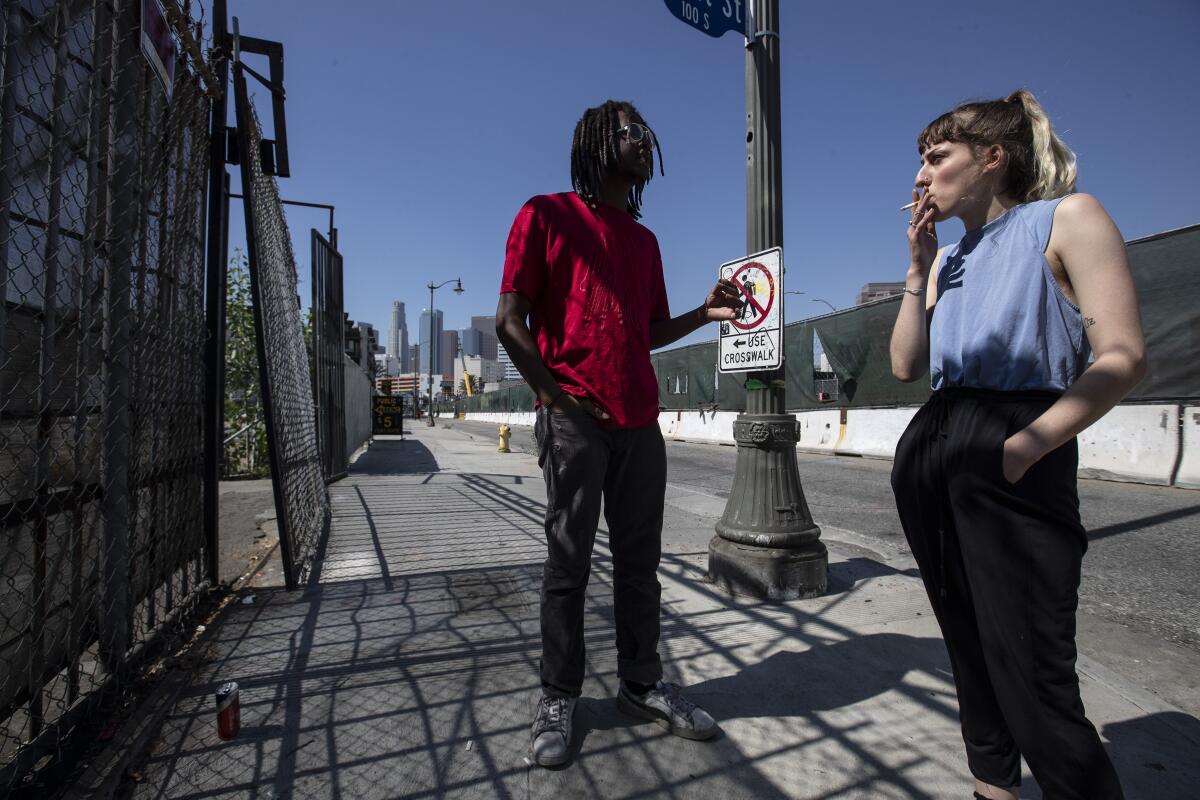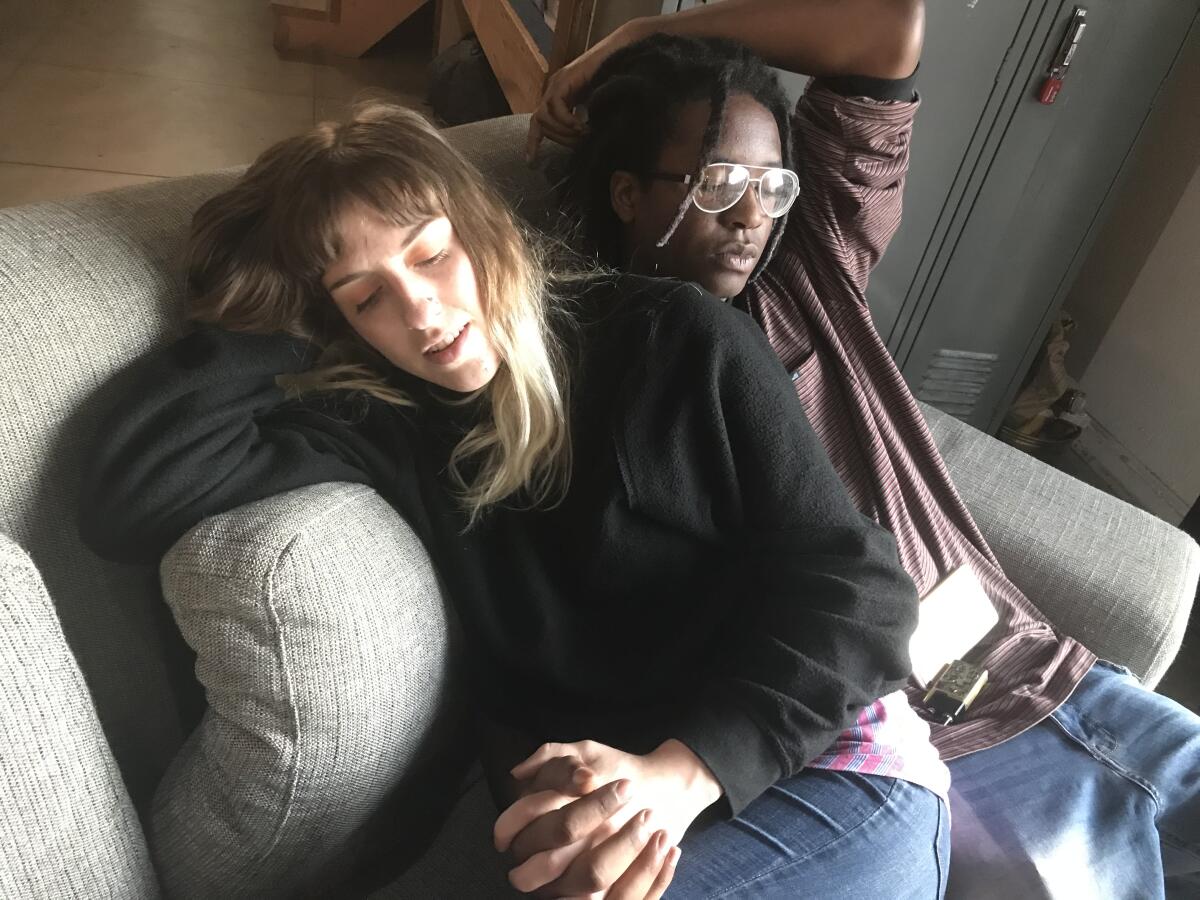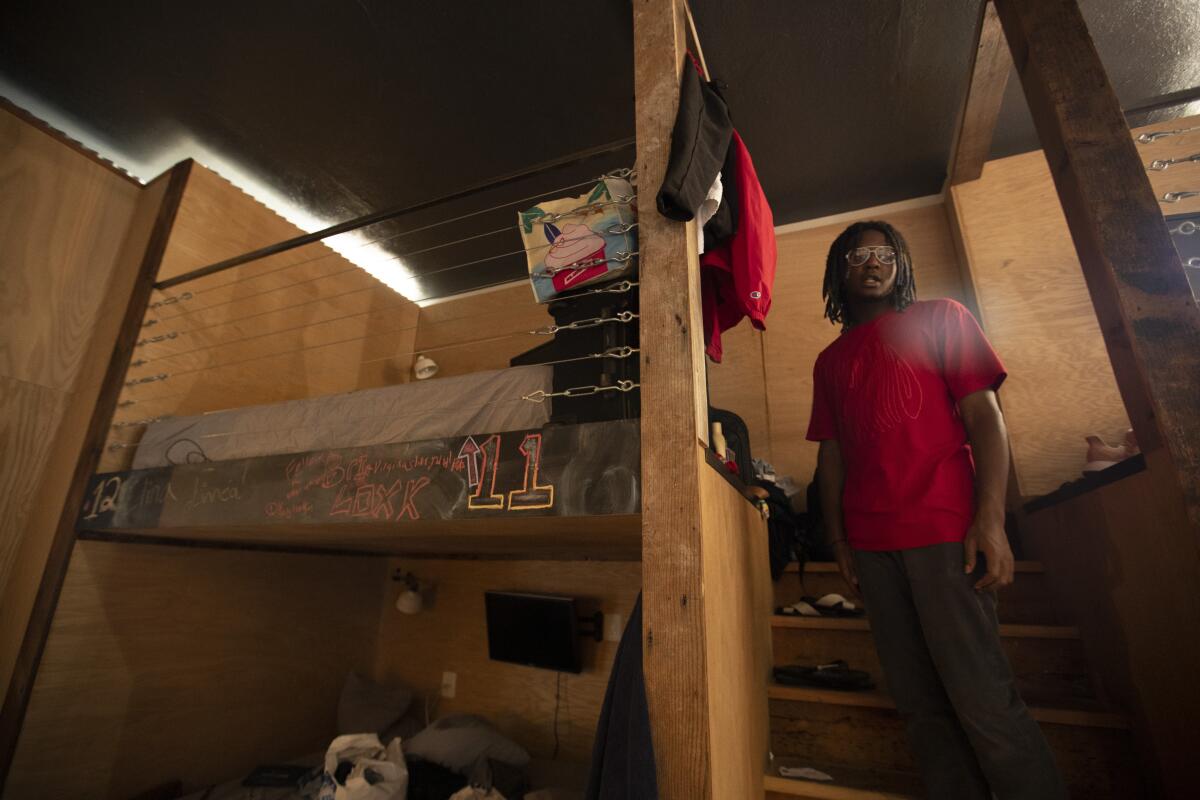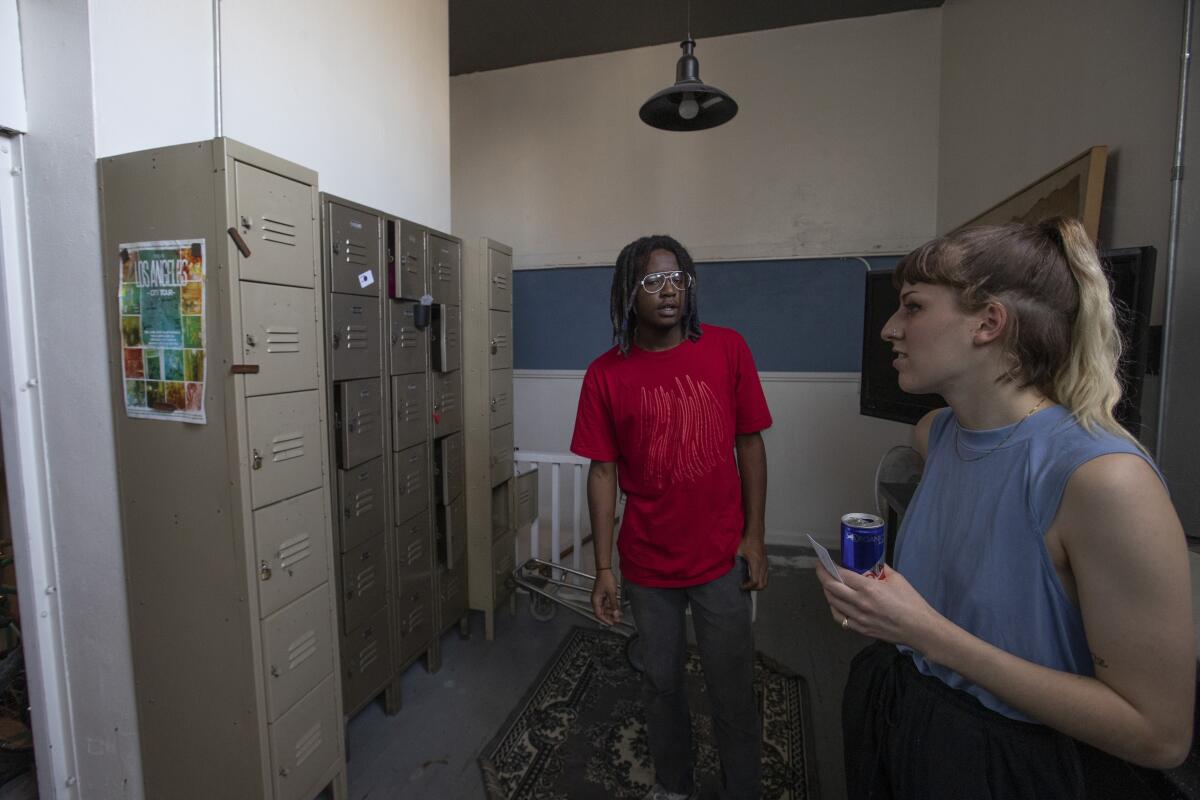They came to L.A. to chase a Hollywood dream. Two weeks later, they were homeless

- Share via
So many people come to L.A. carrying little else but big dreams. One misstep, one con, one stroke of bad luck can be all it takes to derail them.
I recently met a young couple from Detroit whose journey here started with great hope.
They arrived last spring in possession of a promise, $800, two backpacks and two duffel bags.
The promise was what had prompted them to leave home. But it was broken that first day, before they left LAX.
Their interactions in our city then began to fray so fast that two weeks later they were sleeping on our sidewalks.
I asked them if I could tell their story in part to remind us all how swiftly disaster can strike, but also as a nudge to contemplate how we treat others — our newcomers, our most vulnerable, those we routinely write off.
Why tell a person you’ll help them if really you won’t? Some people like to toy, cats pawing at mice.

In Detroit, Loxk Calhoun (pronounced Lock, born DaShawn), had been scraping by for two years on his own since his mother kicked him out at 18. He was thrilled when someone in the music business encouraged him to come to L.A. He describes himself as an audio engineer who also writes music and raps and performs. He wants to be better known. The guy from L.A. said if Loxk just flew out here, he’d put him up and help make that happen.
But Loxk got here and he didn’t. He offered no help at all. When Loxk called from LAX, he said he’d be out of town for a long time.
Loxk and his girlfriend, Bri Meilbeck, who just turned 24, suddenly had only each other. They were novice travelers. They’d been together just one month. In a giant city, they had no one else whose support they knew they could count on.
In a fix, Loxk called another contact on his phone — a music producer he hadn’t yet met. He was relieved when this virtual stranger said that he and Bri could come stay. But the West Hollywood house they arrived at, which looked like a mansion on the outside, turned out to have bedroom after bedroom crammed with bunk beds. Bri and Loxk didn’t know how many there were or even whose house it was.
They also didn’t know that the producer to whom they had given some money owed rent — until one night after dark they got the word that the landlord wanted them gone at once.
This was the moment when they slipped into homelessness and slipped out of the world as they’d known it. They were the only ones who noticed. They had just $50 left.
As they strained to lug all they owned out the door, they knew that they would have to own less. At a dumpster, they shed a lot of favorite clothes, including Bri’s pink Adidas track suit.

Where to go was a problem. They didn’t know L.A.
But there had been a moment during those early days when they were feeling so overwhelmed by the strangeness of it all that they needed to get away and be alone. So they’d splurged on a cheap room at the Las Palmas Hotel in Hollywood, which in “Pretty Woman” is where Julia Roberts lived in the tough times before Richard Gere.
They’d liked that little brush with fame, though there’d be no fairy-tale rescue for them. Now pushed out of the house, they went back to the Las Palmas and scaled the fence of the park next door. Trying not to be seen, they avoided the playground’s rubber mats and lay down on pavement under Bri’s faux fur coat. All that night, she kept her eyes open.
A couple of years earlier, Bri had gotten very close to finishing college. She’d had her act together. She’d never imagined this.
“I was very scared. You could hear people yelling and screaming. I thought someone was going to rob us,” she told me. On her phone, she searched the discussions on the social news website Reddit, typing in phrases: “I just became homeless,” “Where do homeless people go in L.A.?”
::
Early the next morning on Venice Beach, the two bummed a smoke from a homeless man with a dog. He offered up tips for their new life.
Wear fresh socks to avoid infections. Go to St. Joseph Center for help. He walked around with them looking for a tarp and pieces of cardboard for their bedding.
That night and for a few nights to come, until they could get their own, he let them sleep in his little tent, squeezed in with him and his German shepherd, in front of the Public Storage at 4th and Rose avenues.
Applying for jobs was hard. They didn’t have an address and didn’t know where they’d be the next day. In coming days, they got General Relief money to tide them over until they found work. They used some of it for their own tent, placed next to the man and his dog. They also found the nonprofit Safe Place for Youth (SPY), where they could get guidance and take a shower and get fresh clothes and be fed. (Bri said it looked “like high school for homeless kids,” everyone lined up for lunch, wearing backpacks. But it also made her feel much less alone.)

They learned how to keep moving all day, walking around, haunting libraries, riding trains back and forth. At Metro stations, they evaded fares. Bus drivers often let them ride free.
“But sometimes they didn’t, and that’s when we went hungry,” Bri told me, when they couldn’t get to a free meal. “And you get tired of people staring at you on the bus, like, ‘Really? You don’t have $1.75?’”
Often all she could think of was a bed. Counselors told her about places she could go to sleep in one, but not with Loxk so she passed.
On the promise of a bed for the night, the two sometimes hopped into cars full of strangers or hung around miserable motel rooms with people tweaking on meth.
She and Loxk began to feel the strains of a duality they could neither hold as one or ignore.
“At the end of the day, there are the people who go inside and the people who stay outside. No matter what I think of myself, I couldn’t think of myself as better than another person on the street because we were on the street,” Bri told me. “Some homeless people are really mad at the people who go inside.”
“Like really, really mad,” said Loxk.
“Like they owe them something,” Bri said.
They tried not to feel that way, but it didn’t always work.
“The only people that you talk to are people who have mental illness. The only people you talk to are people on drugs. And those are the only things going back and forth in your head, those voices, and it’s just not ideal to keep a peace of mind. You start to get mad because the only things you hear are negative and so you start to get negative,” Bri said. “We were both kind of losing our minds at some point.”
Still, they didn’t, their only drug was pot, and they worked to avoid the darkest thoughts.
Then someone in Venice stole their tent and all the belongings that they didn’t carry with them. They decided they had to move on.
::
In search of peace, they headed north to Malibu Lagoon State Beach. They staked out a hidden, illegal spot. A friend from SPY who had gotten a van gave them his old tent. Surfers knew it was there but didn’t tell.
At a mini-mall and at Malibu Country Mart, they did their best to wash up in the bathrooms. At a nearby Starbucks, they searched Craigslist for jobs. Finally, Bri found one in Malibu, working as a barista as she’d done in Detroit and trying to pass as a housed person.
At Le Cafe de la Plage in the Point Dume Plaza Shopping Center, she often felt conspicuous. She hoped none of her co-workers noticed that each day she wore the same jeans (which she also slept in each night). Once, a supervisor suggested that she needed to clean better under her fingernails. The staff teased her about her big backpack.
Homeless people, Bri said, recognize other homeless people. They understand the big backpacks and the coats worn even in the heat. Before coming to L.A., she didn’t see these things, she said. Now she hoped others like her former self wouldn’t see them either.
::
I met Loxk and Bri downtown a couple of weeks ago, when I was writing about communal complexes with small sleeping spaces known as pods. The two now have one of the larger, full-size bunk beds at a PodShare location downtown.
They had faces that I saw could pose tough and hard, but when they smiled at me, they looked so young.
And when they started telling me their story, which they’d been keeping to themselves, it tumbled out like a burden put down. They told me just the telling felt like therapy.
Loxk and Bri had finally found themselves a way indoors in July, after Bri’s father sold her car for $3,000 back home in Michigan. For $925 a month, they’d gotten a bare room in a house in Watts, where a strange landlady hiding in the back used cameras with sound to keep tabs on tenants.
She’d accepted their cash without questions though, which made renting possible.
But Bri was commuting by bus three hours each way to the Malibu cafe. And the landlady was picking fights, the last over a bowl of spaghetti left in the microwave. “Get off my property,” the landlady screamed. “I don’t care if you’re homeless.” They’d never told her they had been.
The two called SPY saying they had to find a place right away, and SPY reached out to PodShare. The nonprofit and the pod company have a relationship they hope to expand. They want to open a PodShare location to transition homeless young people off the streets.
PodShare’s owner, Elvina Beck, agreed to give Loxk and Bri a spot downtown for $700 a month. They each agreed in turn to help clean the place eight hours each week. They’re now in their second month there. Bri has a job nearby as a barback at Soho House. Loxk has been cooking at a restaurant in North Hollywood and working on his music.
They aren’t heading home, they say. They’re going to try to stick it out here.
But they don’t recommend L.A. for everyone.
Even Detroit, so well known for despair, doesn’t leave people lying on its streets, they tell me.
“There’s no homeless people on the streets of Detroit,” Loxk says, as Bri nods her head.
“There’s houses you can go into. There’s family,” she says. “People have each other’s back.”
More to Read
Sign up for Essential California
The most important California stories and recommendations in your inbox every morning.
You may occasionally receive promotional content from the Los Angeles Times.











